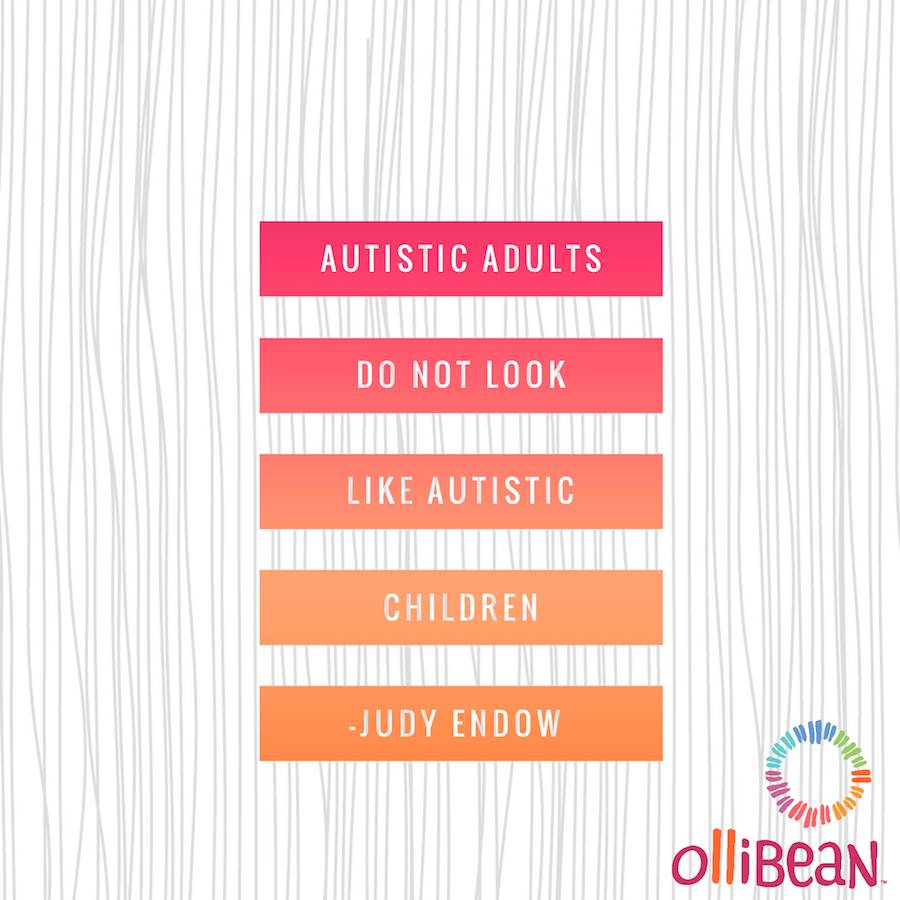I recently presented to a room full of people on the topic of Autistic People and Literacy. A few days later I again presented to another group of people on another autism related topic.
It doesn’t matter the autism topic or whether the group I am presenting to be educators, therapists, or parents of children with autism – I am almost always approached by someone wanting to know how it is that I do not look or act anything like the autistic children they know.
There are many reasons autistic adults do not look like autistic children.
Here are some to consider:
1. The first reason is that all children grow up. Adults, whether autistic or not, generally do not behave in their everyday lives the same way they behaved as small children. We all grow and change with maturity. Autism does not prevent a person from growing and changing over time.
2. Autism means, in part, developmental delay. When we are children this delay can be huge, making us look very different from our same-age peers. However, delay does not mean stagnant. It simply means delay. Developmentally appropriate things that cannot be done at the correct age can often be accomplished later in life. Typically, this takes a lot of support and effort, but over time that support, effort and direct instruction tends to pay off, as we grow older, being able to do many things than we couldn’t as a youngster.
3. Autism means there are communication challenges. Even so, everyone communicates, including nonspeaking autistics. Challenges are the biggest when they are the newest. Over time communication challenges can be addressed, accommodated and supported. This takes time and much effort. The result is that the communication challenges seen in a 3 year old or a 12 year old will likely not look the same when that child is 30, 50 or 70 years old.
4. I personally have not met any autistics (and I have met a lot of people from my tribe) that have not been challenged by their sensory differences. Again, the challenges are the greatest when we are youngsters because we have not yet learned how to manage our sensory system in a world that is geared for people with “typical” sensory systems. By the time we are 40 or 60 years old we are more in-the-know and can plan for meeting our own sensory needs much better than we could as youngsters.
5. Autistics want friends just like everyone else. As youngsters, most of us do not have the skills to make that happen. Also, children are grouped together according to age and due to our developmental delay we are often not social peers with same-age children. This compounds the difficulty in making friends. Early adulthood can be especially challenging as we are often socially and emotionally at a much younger age than people expect when they look at us. It is often taboo for young adults to have friends who are children, even when the young adult is the same emotional age as a 10 or 12 year old. It takes a lot of years for this to get better, but it can and does get better for a lot of autistics. Just think about it – it would be considered “inappropriate” for a 22 year old to befriend a 14 year old because of the eight-year difference, but when you are in your 30’s or 50’s nobody cares if there is an eight-year or more difference in age between friends.
These are just a few of the reasons why autistic adults do not look like autistic youngsters.
In my case, there are a few more points to consider. Not only am I autistic myself, but autism is my profession. I work in the field, have written several articles and books and have made more than 300 presentations in the States and internationally. To do my work I must be diligent in my sensory regulation every day, I have mentors who I can turn to around communication struggles and other challenges, and I generally know what I need and how to ask for it should the occasion arise.

Even so, I am just as autistic as ever. I no longer live in an institution or use body slamming to communicate my needs. Over the years I have learned to work with my autism, honoring who I am in this world. Some days I am better at this than other days. I am nearing retirement now and when people approach me and are befuddled that I do not look anything like their autistic youngster these are the things I would like them to consider. Yes, autism can be difficult. I know. I live it everyday. It is my life. It is my profession.
Yes, I agree – autistic adults do not look like autistic children. It is because autistics have unlimited potential.









[…] of the hard life lessons I’ve learned in the Bay Area is that, even among software engineers, my autistic traits make me stick out like a sore thumb. I can churn out code like nobody’s business, I’m pretty […]
[…] Entrada original: Autistic adults do not look like autistic children […]
My son is 41 years old with HFA. He has always had a job doing repetative work. He has had many challenges because of his inability to explain himself. He becomes very frustruatend and plapps his hand more when he is anxious. I often have to talk to his job coach to see what is going on. A lot of people who work with adults with disabilities are great, but some are not and have no patience or knowledge on how to speak to them. Who ever works with them can either make them or break them. I wish more people were trained to help Adults with autism. What will happen when I’m gone! He is like a young person who loves baseball. He can tell you everything about the Padres. He does not drive. He has a hard time passing the test. He is good at taking busses though. He tells me he feels misunderstood… I wish people would be more sympathetic and willing to help him and others like him. Sincerely, Retired Mom
Hi There,
Thank you for sharing !!! I am also have Autism I am High Functioning. Even though I was diagnosed as an adult I feel I am learning more and more everyday how to understand myself better.
I know someone who is on the low Functioning end of the Autism Spectrum. I am also trying to understand him more as well and all the different levels and traits of Autism.
I would just like some advice about him as he has been acting very defiant lately and I’m not sure if that’s his Autism or if it’s actually Autism mixed with Intellectual Disability because he is nearly 20, so a grown adult but acts as if he is 4 yrs old?
I have recently been diagnosed as an adult with autism. Can u tell me where i can get help and understanding in Adelaide Australia. So sick of struggling. Thank you
[…] Judy Endow, eine autistische Autorin, hat eine weitere Begründung für Altersunterschiede unter Bekannt- und Freundschaften, die sich jedoch oftmals erst spät zeigen: […]
Thank you! I needed this today.
Fantastic insight! Thank you. Sharing, sharing, sharing.
Yes, this is great. Answer to those comments that begin, “But you can’t be autistic because you can do X.” So much stereotyped thinking about us. And way too much online about autism being about children. Balance, like this, is vital. I feel like asking NTs if THEY are precisely the same as they were when they were 5 or 10.
Thank you, Judy! Well said.
BRAVO!
This 56-year old Autistic thanks you and wishes I could hand everyone in my life–especially all the ” professionals” who doubt I could possibly be autistic because I make eye contact and talk to them–a giant-sized copy of your article, (along with some choice comment of my own) and the suggestion they get more education about adults with autism ASAP because they are woefully ignorant about a specialty about which they are supposedly well-trained!” *sigh* I am so tired of trying to educate theses smug ignoramuses. Why is it MY job to teach them theirs?!!
Great read, Thank you
[…] Full Article : http://ollibean.com/2015/02/23/autistic-adults-do-not-look-like-autistic-children […]
[…] Источник: Ollibean […]
[…] […]
I have met many people with autism through out my life , some of the most talented truthfull , sometimes inappropriate , but wonderfull people , you sound amazing judy thank you
Needed to hear this…..thank you x
Thank you!
Whenever I read you work, I have such hope for my son. You give so many autism parents, particularly those in developing countries, the strength and knowledge to push through our challenges and help our children achieve their full potential. Merci!
Very encouraging as a parent of an autistic child. Thanks
My husband once said to me, “I would never suggest that all of the intensive intervention and structured living we have done for A didn’t make a huge difference in his phenomenal progress, but there’s also something to be said for maturing.” He was absolutely right! It is in the normal ebb and flow of life that our son has learned to adjust to everything around him. He looks NOTHING like he did even 5 years ago. He’ll be 20 soon!! This was a great article!!
It routinely makes my brain ache to read things like this. Of course we’re different than autistic children! We are adults! Is pattern recognition really that difficult for the average person?
My brother, who is autistic is in his fifties. He has been treated well for most of his live, if not all. The people who care for my brother, and the others he lives with, are very kind. I’ve known him all his life. He is continuing to learn.
Excellent!
Love this one! I think, as parents, we often forget to look at the big picture and get wrapped up in the immediate challenges our kids have. Bookmarking this one so I can re read it when things get tough for my little guy.